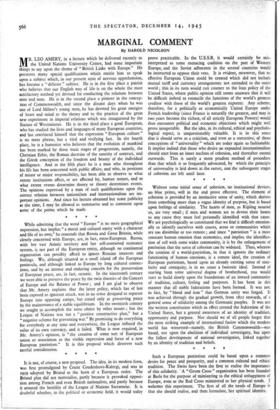While admitting that the word " Europe " is no
mere geographical expression, but implies " a moral and cultural entity with a character and life of its own," he contends that Russia and Great Britain, while closely concerned with Europe, are, in fact, extra-European. Russia, with her vast Asiatic territory and her self-contained economic system, is not part of the European entity, although no continental organisation can possibly afford to ignore Russian interests and feelings. We, although situated as a small island off the European peninsula, and although linked to Europe by long cultural connec- tions, and by an intense and enduring concern for the preservation of European peace, are, in fact, oceanic. In the nineteenth century we were able to preserve the peace by the twin theories of the Concert of Europe and the Balance of Power ; and I am glad to observe that Mr. Amery explains that the latter policy, which has of late been exposed to ignorant attack, was in no sense designed to separate Europe into opposing camps, but aimed only at preserving peace by the maintenance of a stable equilibrium. In the twentieth century we sought to accomplish the same object by other means ; but the League of Nations was not a " positive constructive plan," but a " negative scheme for preventing war." By promising to do everything for everybody at any time and everywhere, the League inflated the value of its own currency, and it failed. What is now required, in Mr. Amery's opinion, is " the creation of some sort of European union or association as the visible expression and focus of a new European patriotism." It is this proposal which deserves such careful consideration.


























 Previous page
Previous page